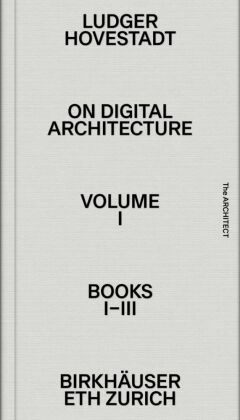
On Digital Architecture in Ten Books: On Digital Architecture in Ten Books - Vol. 1: Books I-III.
| Verlag | Birkhäuser Berlin |
| Auflage | 2022 |
| Seiten | 224 |
| Format | 14,4 x 2,1 x 25,1 cm |
| Gewicht | 419 g |
| Artikeltyp | Englisches Buch |
| Reihe | Applied Virtuality Book Series 19 |
| ISBN-10 | 3035625980 |
| EAN | 9783035625981 |
| Bestell-Nr | 03562598A |
Abhandlung zur digitalen Architektur
Hovestadts Traktat folgt strikt den Linien der bekannten Abhandlungen von Vitruv und Alberti, in der Annahme, dass wir uns heute wieder in einer ähnlichen Konstellation befinden. Vitruv und Alberti brachten zum Ausdruck, was Architektur in ihrer Epoche bedeutete: die römische Antike und die Renaissance. Hovestadt formuliert sie nun in den heutigen Begriffen der Physik, Mathematik, Technologie, Literatur und Philosophie neu.
Die Bücher I bis III befassen sich mit der Rolle des Architekten und der Objektivität der Architektur.
Die Bücher IV bis VI thematisieren die Modalitäten des Sprechens und der Kodierung von Architektur: das Geheime, das Öffentliche und das Private.
Die Bücher VII bis X widmen sich den eigentlichen digitalen Mechanismen: künstlicher Intelligenz, natürlicher Kommunikation, Gnomonik und kulturellem Erbe.
Ein Architekturtraktat unserer Zeit in 10 Büchern Nach dem Vorbild von Vitruv und Alberti Erscheint in drei Bänden der Reihe Applied Virtuality Book Series, Bd. 19, 20 und 21
Ludger Hovestadt, professor of architecture and CAAD, ETH Zurich
Treatise on digital architecture
Hovestadt's treatise strictly follows the model of the famous treatises by Vitruvius (De architectura) and Alberti (De re aedificatoria), based on the supposition that we find ourselves in a comparable situation today. Vitruvius and Alberti expressed the meaning of architecture in their eras: Roman antiquity and the Renaissance. Hovestadt has done the same for the present day, incorporating considerations of physics, mathematics, technology, literature, and philosophy.
Books I to III deal with the role of the architect and the objectivity of architecture.
Books IV to VI address the modalities of speaking about and encoding architecture: the secret, the public, and the private.
Books VII to X are dedicated to actual digital mechanisms: artificial intelligence, natural communication, gnomonics, and cultural heritage.
An architectural treatise for our age in 10 books Inspired by the work s of Vitruvius and Alberti Published in three volumes in the Applied Virtuality Book Series
Ludger Hovestadt, professor of architecture and CAAD, ETH Zurich
